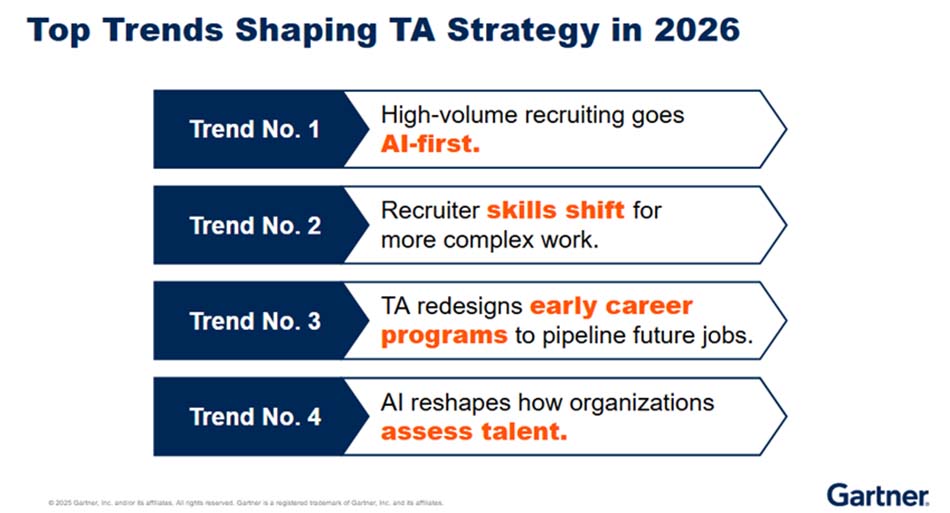Talent acquisition strategies in 2026 are being driven by AI, which is changing nearly every aspect of how business is done, and the need to drive cost out of the business, according to Gartner.
The research has identified four trends that will shape talent acquisition in 2026:
- High-volume recruiting goes AI-first
- Recruiter skills shift for more complex work
- Talent acquisition redesigns early career programs to pipeline future jobs
- AI reshapes how organisations assess talent

“Many AI use cases in recruiting have been around for a long time, and we’re starting to see real value,” says Jamie Kohn, senior director: research, in the Gartner HR practice. “Now new AI technologies are emerging with the potential to fundamentally reshape recruiting, like generative AI, interview intelligence tools, and recruiter AI agents.”
Organisations are advised to consider the following aspects of talent acquisition in 2026:
Injecting AI into high-volume recruiting
High-volume, low-complexity roles – frontline roles such as retail workers, customer service reps, drivers – are ideal for an AI-first approach. They have the highest potential for cost savings, the stable, repetitive work is a good fit for AI capabilities, and there’s less risk of backlash from candidates or the business as these roles already have a low service level.
Before leveraging AI for high-volume roles, talent acquisition leaders should consider the following:
- Hands-on monitoring is a must. As agentic AI evolves, recruiting leaders should define the reasonable range of outcomes ahead of time and watch closely for deviations.
- There is such a thing as too much efficiency. Inserting a realistic job preview into the process can guard against a flood of low-quality applicants by helping candidates think through whether they actually want the job before they apply.
- Reframe the risk of bias. Talent acquisition leaders should refocus stakeholders on how an AI-augmented process is less biased than the current human-only system.
- Candidates expect transparency and, if possible, choice. Recruiting leaders should clarify how they use AI in the hiring process and allow candidates to opt out of AI interviews. This can build trust with candidates about being treated fairly in the hiring process.
Shifting recruiters to more complex work
“AI has the potential to impact nearly every part of the recruiter role, if it isn’t already,” says Kohn. “Redesigning the recruiter role isn’t just about understanding what technology can do; it’s about understanding how recruiting itself is changing.”
As AI and automation take on more of the low-complexity work, recruiters’ ability to deliver on high-complexity hiring becomes more critical. Recruiters today must advise on talent strategy and role design to meet hard-to-find, in-demand skill needs while also possessing the skills to build long-term relationships with hard-to-access prospects.
Finally, recruiters must be able to assess candidates’ fit for the organization’s future needs, not just the current role.
Redesigning early career programs with AI
By 2030, half of enterprises will face irreversible skill shortages in critical job roles due to GenAI accuracy decline, skills erosion and uncompetitive pay.
Organisations need to rethink their whole early-career talent strategy; talent acquisition, specifically, needs to help their organisation rescope what early career roles are needed and why.
Ultimately, recruiting leaders must work with business leaders to refocus early-career programs around safeguarding future talent pipelines. New graduate hires must provide value today, but they should also have potential to fill critical talent gaps in the future.
Reshaping talent assessment for generative AI
Candidate quality is being threatened by the rise of candidate fraud, candidates’ increasing use of generative AI in the hiring process and rapidly changing skills.
“Maintaining candidate quality requires organizations to assess candidates’ true abilities without GenAI while also integrating AI into assessments for roles that have to use it on the job,” said Kohn.
Gartner predicts that by 2027, 75% of hiring processes will include certifications and tests for workplace AI proficiency. GenAI-based assessments can allow organizations to evaluate both critical generative AI skills and core skills, including critical thinking ability, subject matter expertise, creativity and communication. This gives recruiters and hiring managers a better sense of candidates’ true ability to do the work.

